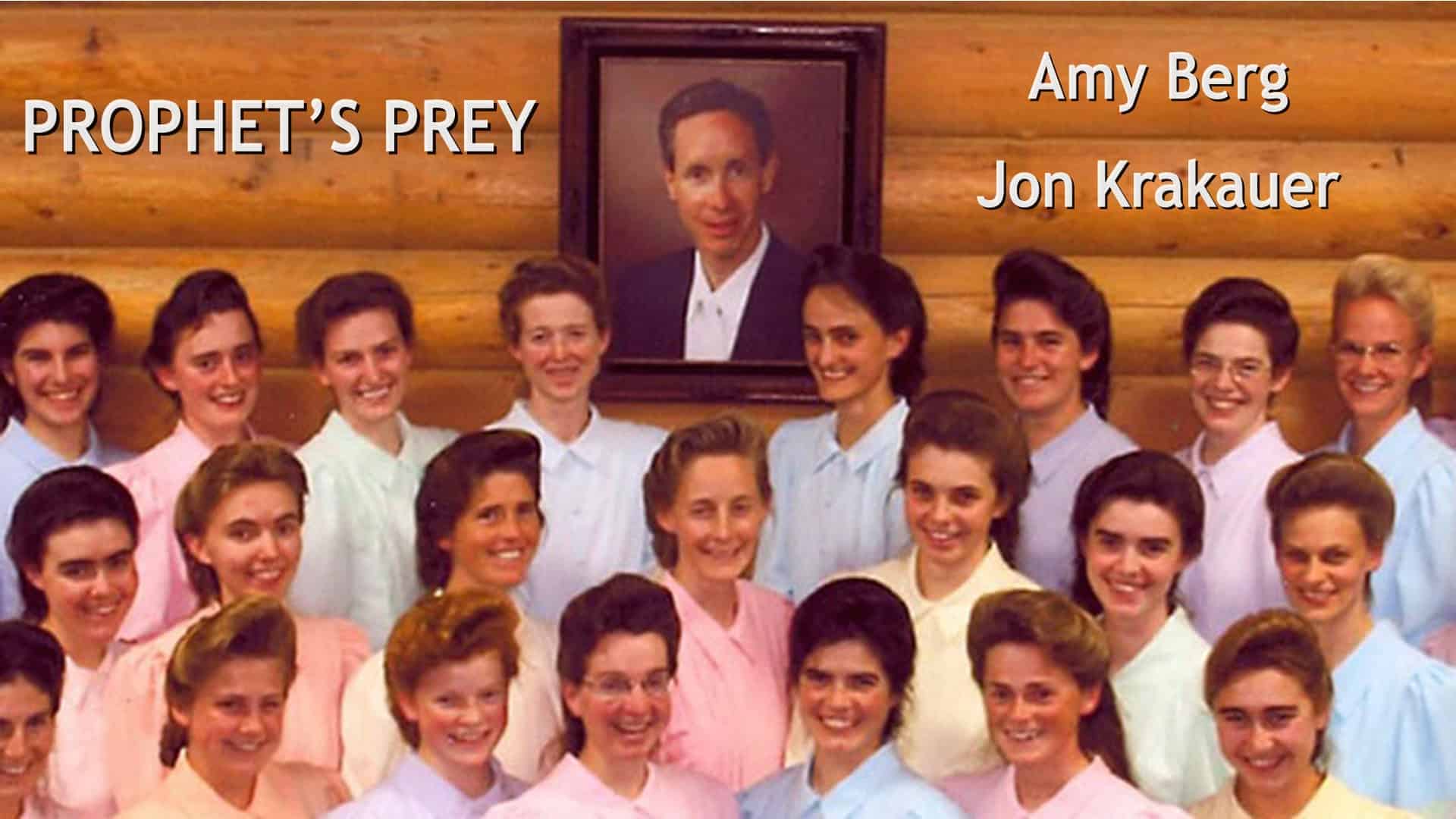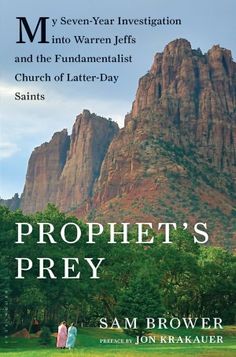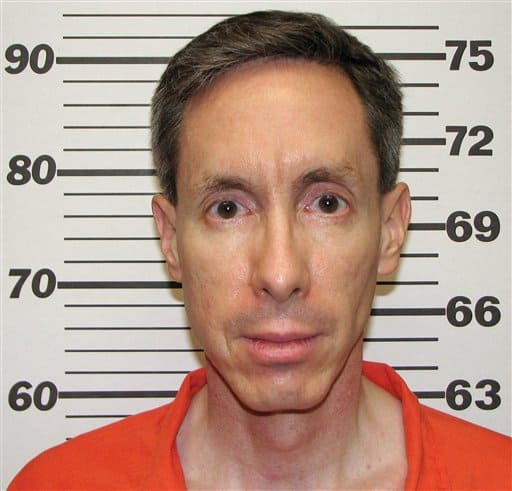From Bounty Hunter to Producer (Interview)
He’s been a bounty hunter, a private investigator and an author. Now Sam Brower is the producer of a feature-length documentary. Brower spent seven years investigating and tracking down Warren Jeffs, the leader of the Fundamentalist Church Of Jesus Christ Of Latter-Day Saints (FLDS). Brower finally got his man and Jeffs is now serving a life sentence for sexually assaulting two underage girls. The resulting film, Prophet’s Prey was directed by Amy Berg (West Of Memphis) and is now screening at this year’s New Zealand International Film Festival. The 13th Floor’s Marty Duda spoke to Sam Brower about his hunt for Warren Jeffs and how his book became a film.
Listen to the interview with Sam Brower here:
Or read a transcription of the interview here:
MD: I guess my first question is, I know that, this film is based on the book that you wrote about the same subject matter and I was wondering what the process was like for you to go from it being a book to a film.
 SB: Actually it was something that Jon Krakauer and I worked very hard to try and make happen. We just kind of started brain storming. You know talking about yeah Pulitzers are good and helps get the word out and that’s really a real motivation to bring awareness to this problem. And so we started talking about you know, well books are good but maybe film’s better. Yeah film you know can get out to millions of people and all around the world, you know there’s a huge audience. But we knew it had to be a really good film if we’re going to do that and so we, what we researched and sought out Amy Berg and tried to find the best people and it got the interest of Imagine Entertainment and Ron Howard and Brian Grazer and Showtime came in on it and we hooked up with Amy Berg, the best director for documentaries in the country and we’ve been very fortunate that it’s done very well and it really is starting to bring some real awareness and attention to this problem.
SB: Actually it was something that Jon Krakauer and I worked very hard to try and make happen. We just kind of started brain storming. You know talking about yeah Pulitzers are good and helps get the word out and that’s really a real motivation to bring awareness to this problem. And so we started talking about you know, well books are good but maybe film’s better. Yeah film you know can get out to millions of people and all around the world, you know there’s a huge audience. But we knew it had to be a really good film if we’re going to do that and so we, what we researched and sought out Amy Berg and tried to find the best people and it got the interest of Imagine Entertainment and Ron Howard and Brian Grazer and Showtime came in on it and we hooked up with Amy Berg, the best director for documentaries in the country and we’ve been very fortunate that it’s done very well and it really is starting to bring some real awareness and attention to this problem.
MD: Right, right. Yeah I know Amy Berg is fairly well known in this part of the world because of the West of Memphis film which was I believed co-produced by Peter Jackson who’s from New Zealand of course. So that the film was quite made a big sensation when it was played down here at the film festival a few years ago. How did you present the concept to Amy about directing the film and what it was going to be?

SB: Well Amy was kind of you know a friend of a friend type thing. I watched Deliver Us From Evil and I thought oh my gosh she’s the one. And when she heard about what it was about and just how horrible this is and the things that have been taking place, taken place, she was very anxious to get involved in it. I think it helped awake the activist in her.
MD: Right.
SB: Yeah she was very anxious to get involved.
MD: Excellent, excellent. You of course, appear in the film and it seems to me just from the little bit of reading I’ve done about you and from what I saw in the film that could easily be a film made about you as well. You’re a private eye. What other things did you kind of get up to before you got involved with this writing of the book and the film. Were you a bounty hunter as well?
SB: Yeah, yeah. I was a private investigator. I got, that was my education, criminal justice. I had a friend who was murdered many years ago and I always thought, ‘You know, if I ever have the opportunity, I’m going to find out who did that,’ cause nobody ever found the pe4rson who killed him. So after I graduated and became a private investigator and started on that journey, I went back and helped to the find the killer. He was actually convicted twenty six years after that.
MD: Oh my God.
SB: Yeah. So that was kind of my intro into the P.I. work.
MD: Right.
SB: And I became a bounty hunter. I just got good at finding people. I became a bounty hunter and kept the P.I. business and then when I started becoming involved with this FLDS problem, about ten plus years ago, I gave up the bounty hunting and just concentrated strictly on P.I. work.
MD: Right. Why do you think it took a private investigator to be able to get into the substance of this problem rather than the normal government. You would think the police and whoever would be all over this thing.
SB: Well you’d think. I think one of the biggest problems is law enforcement is it’s too caught up in the day to day things. And this is not easy.
MD: Right.
SB: One sheriff said, ‘You know just grow your hair long and grow a beard and infiltrate them.’ And he’s right. It’s difficult, its complex and they’re very good at what they do and they’re able to hide behind this façade of religion. So I think it’s not an easy task and most regular law enforcement agencies and police are busy catching crooks, you know…
MD: Yeah.
SB: The guy that stole your neighbour’s lawn mower out of the garage or stuff like that.
MD: Right.
SB: They’ve got their day to day criminal activity and this is very hard to crack. It takes time and energy and tenacity.
MD: So how did you get brought into the whole situation? Were you hired by, was it Brent Jeffs or…
 SB: Brent Jeffs actually kind of turned me to where it became more than just another P.I. case. When I, when Brent told me his story and what happened to him, how he was raped by his uncle Warren, you know that was kind of, ‘OK I’ve got to do something about this.’
SB: Brent Jeffs actually kind of turned me to where it became more than just another P.I. case. When I, when Brent told me his story and what happened to him, how he was raped by his uncle Warren, you know that was kind of, ‘OK I’ve got to do something about this.’
MD: Right.
SB: But I actually became involved first with a guy named Ross Gatlin who kind of peaked my curiosity because I picked up paper and there he is holding up a copy of The Rise And Fall Of The Third Reich, right on the front page of the paper. I’d been in Utah for about ten years and never really been out to Short Creek were all the FLDs lived. I decided to go check it out and I went and found him and started talking to him and I found out it was much worse than I ever could have imagined.
MD: Right. I mean it’s incredible to think that this kind of thing can go on in modern day United States right under everyone’s noses. Did you get, kind of gain any insight from talking to the people about how they were able to become, for want of a better word, brainwashed or just you know convinced that this guy had this power over them.
SB: Well that’s the thing you know. We use ‘brainwashed’ because that it’s hard to come up with different nomenclature for it, but it actually goes much deeper than that. When you’re brainwashed normally you come from a place of normalcy sometime in your life you know you. But with this group, they are born into it. And so they’re really indoctrinated from birth and there’s no sense of normality, no place to go back to, no normal point in your life. And Warren Jeffs is a genius. He was able to pick up on that, pick up on the fact that they’ve been raised and bred to be obedient and so it’s just one little step at a time. He’s been able to manipulate them and manoeuvre them and get them to do literally anything he says because everything he says and does comes from God.
MD: Yeah.
SB: And they believed that. They believe that with everything they’ve got.
MD: Amazing. The incredible thing is, I don’t know if you’re finding this out, but it’s not just in the United States that this is happening I mean here in New Zealand we have a commune called Gloria Vale which is run by this guy named Neville Cooper who got arrested in the mid-90s for abusing young girls and he spent five years in jail and he’s 88 years old now and he’s still out there doing his thing and it’s not an isolated incident which you are uncovering.
SB: I am finding that out. I just got back from Scotland few weeks ago.
MD: Really.
SB: And they have gone on there and you know everywhere you go there seems to be these types of mad men, these demigods that find a hook and play it for everything they can.
MD: Did you get to spend much time with Warren Jeffs himself? Have you spoken to him? Did you get a sense of how he manages to persuade these people?

SB: You know I’ve spoken to him a couple times, in probably what he didn’t think was the ideal setting for a deposition. But I talked to literally thousands of people, I interviewed thousands people and I’ve listened to thousands of hours of his sermons, really got to know him very intimately through reading thousands of pages of what we call the ‘printed record’, it’s a record that he kept much like Adolph Hitler kept a record in Nazi Germany, of everything he did. I mean from the time he woke up in the morning even throughout the night he would have wives sit in the room while he slept and write down what he did while he was sleeping and what he said while he was sleeping and everything, 24 hours a day.
MD: Right.
SB: So it had valuable insights. And that turned into the most damaging evidence against him when he went to trial.
MD: Right. Just become such a narcissist I guess that he kind of hung himself. I think the most interesting points that the film makes near the end is the fact that how difficult it is to change people’s mind even when they’re presented with all this evidence to the contrary and how that kind of can be seen in other political things and like the whole controversy with the Confederacy flag that’s going on in South Carolina. People just refuse to accept a different idea because they have grown up with it for so long and you know it’s a perfect lesson to be learned in this film is that something that…
SB: It’s kind of a lesson in human nature how you get… you know that they’re born into it. Their grandparents, their great grandparents, their parents, everybody they know believed the same thing. And they’re so sequestered from the outside world they really don’t have a good glimpse of what the real world’s like. And even years later, even though they know that out of the group, they know Warren Jeffs is a crook and a criminal and they’ll still see him and kind of still address him in their traditional way.
MD: Right.
SB: And you know keeping some of those old customs I guess that remind them of where they came from or just part of who they are.
MD: Yeah. I just have to say that one of the creepiest moments in the film was the footage of him singing Blowing in the Wind which happened to have been recorded on this date back in 1962.
SB: I had quite a few of those actually that I gathered over time. The people…I mean his voice is just like fingernails on a chalkboard to me.
MD: Right.
SB: But a lot of the people there think that he has a great voice you know, he’s mesmerizing to them. So I couldn’t resist putting a little bit of that in there.
MD: Very strange. But I see that the music in the film is written by Nick Cave and Warren Ellis who are very popular down in this part of the world as well. Is that something you had anything to do with or was that Amy Bergs’…
SB: No that’s Amy, that was, Amy picked the right people.
MD: Yeah definitely. And just the whole thing seems very Shakespearean. I mean you kind of touched on the idea that, you know, he may have actually had something to do with the demise of his father and he was marrying his father’s wives and all the stuff. It just seems incredible that you know this sounds like stuff that should have happened five hundred years ago rather than…
SB: Oh I know. It really is kind of like some kind of medieval weird court thing that goes on you know. And he did and he planned it so he could take his father’s wives when his father died. We definitely believe that he arranged for his father’s death. And did it just like he’s saying, that kind of real subtle, medieval, get rid of the old man fashion.
MD: So now that the film is out and made and is being shown, what do you kind of hope to achieve from people seeing this? Is it something that they can do to react, a reaction to what’s going on?
SB: Like you said, this is something happens all over the world. Here in the US I guess one of the most amazing things is you know people look at it and say, ‘That kind of stuff isn’t supposed to happen here,’ you know in this day and age. But the fact is, it is and the hope is that it is hard it’s hard to stop, and it’s hard to infiltrate and the hope is that that awareness will bring in more attention from law enforcement, from politicians, from the government to act on what’s happening. I mean there are literally the largest organized crime syndicate in the country that specializes in trafficking children.
MD: Right. What does it have like 10,000 members or something like that?
SB: 10 to 15,000 members, yeah, and they have compounds right up you know throughout the country who are called places of refuge. And these children are trafficked in work crews that are boys to different states all over the country, used in construction projects for large commercial job, farming operations, manufacturing operations. They bring in millions of dollars for the church every month. So the hope is that they can be cracked.
MD: Right.
SB: Some group of really dedicated law enforcement can be that team of Untouchables goes in there and put the thought of, not only that but there are other groups all over the country all over the world that you can stop as well. It’s a problem.
Click here for more info about Prophet’s Prey screening at the NZIFF.
- Civil War – Dir: Alex Garland (Film Review) - April 9, 2024
- Pearl Jam – Dark Matter (Monkeywrench/Republic) Album Review - April 1, 2024
- Blonde Redhead – New Zealand Tour 2024 - March 14, 2024
